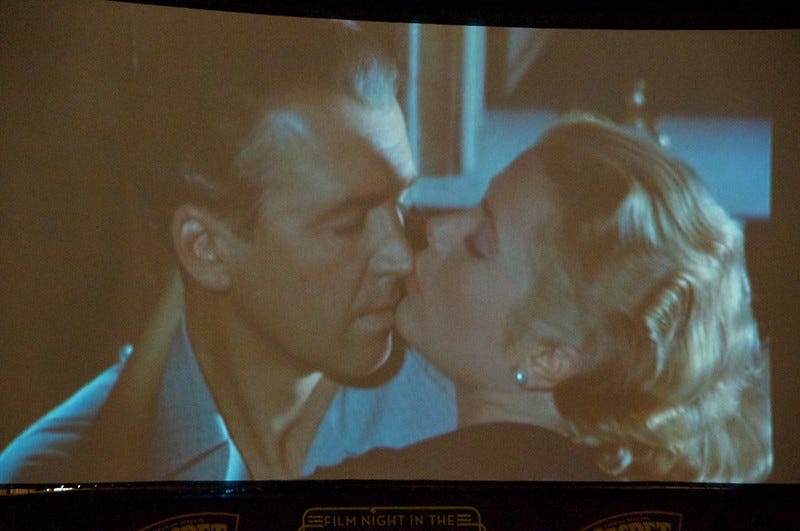CLASSIC FILM REVIEW: "Rear Window"
Alfred Hitchcock's exploration of life in a New York City courtyard blends heat, voyeurism, and suspense.
By Alan Herrmann
FILM CRITIC

Considering the temperatures of late, a classic thriller about a laid-up photographer confined to his Greenwich Village apartment during a New York City heatwave seemed appropriate. The film is Rear Window, from 1954, and is one of Alfred Hitchcock’s finest.
The frustrated, overheated, and nearly immobile photographer A.B. “Jeff” Jefferies (James Stewart) spends his days looking out his window at the rear windows of his fellow renters across a courtyard. He is an active guy used to traveling around the world to get thrilling and often dangerous photos – which explains the broken leg – now relegated to a passive role in a wheelchair.
At first it’s a mild distraction, a way to pass time, but Jeff starts using binoculars and his telephoto lens to spy on his neighbors. He eventually identifies them with nicknames. There’s ‘Miss Torso’ a dancer who practices her moves in front of her window, ‘Miss Lonely Hearts’ who sets a dinner for two but eats alone, and the composer whose apartment living room is dominated by a piano. Plenty of other lives are exposed for Jeff’s amusement – there are thirty-some apartments – but one is particularly intriguing: Lars Thorwald (Raymond Burr), a salesman whose infirm wife seems to have disappeared.
In the midst of all this ‘window shopping,’ Jeff is joined by his girlfriend, Lisa, a high-society fashion model (Grace Kelly). She loves Jeff, wants to marry him, and believes they both can have a wonderful marriage and work life despite their differences. Jeff’s wise-cracking visiting nurse, Stella (Thelma Ritter) is a scene-stealer who questions the ethics of peeking into other people’s lives. “We’ve become a race of peeping Toms,” she tells Jeff as he peers across the courtyard, switching from his binoculars and his even more intrusive telephoto lens, and becoming more obsessed with Thorwald’s nocturnal behavior.
Eventually even Lisa and Stella get pulled into spying on Thorwald. As the trio begins to truly fear something bad has happened to Mrs. Thorwald, Jeff contacts his detective buddy, Tom Doyle (Wendall Corey), for help. Tom reluctantly investigates and finds no clear evidence of wrongdoing. But Lisa and Stella are still suspicious and do some snooping on their own.
Meanwhile Jeff must watch helplessly in his chair. It is this dynamic that makes the story so interesting. Here we have a rugged photographer who has been in war zones, natural disaster areas, and other dangerous places who tells Lisa she couldn’t hack that kind of life. He views her as insulated by comfort and wealth. And yet as he sits, unable to physically participate, Lisa climbs a ladder outside Thorwald’s apartment in a cocktail dress to seek evidence of his alleged crime. When Thorwald catches her in his apartment, she allows him to have her arrested so she will be safe with the police.
The entire film was shot on an elaborate set where over thirty apartments were built to scale, and the rear windows of Jeff’s neighbors became miniature movie screens. There were trees and gardens, even an alley giving way to a view of a city street. At the time, it was the largest set ever built on the Paramount lot. The apartments look very real and are all furnished with personal touches to add to the authenticity.
The music for the film doesn’t use a traditional score to increase suspense or enhance the action. Instead, the natural sound of radios and record players competing throughout the apartment complex gives the film a true sense of communal living. There is one romantic theme that actually comes from the frustrated neighbor, a composer Jeff has observed at his piano. It is this music that Miss Lonely Hearts hears and responds to, stopping her from committing suicide to end her loneliness after a series of failed encounters.
Rear Window is a classic for several reasons, including those previously mentioned – the set, the music, the romantic struggle between the two leads – but it’s the film’s theme that still speaks to us today. We are even bigger voyeurs, who use our phones to secretly record people. Worse yet, we share this personal information – audio, pictures, videos – online, where it lives on forever. If she were around today, Thelma Ritter’s Stella would feel righteous, and hate every minute of it.
PARA 3
PARA 4
other paragraphs
Local Obituaries
To view local obituaries or to send a note to family and loved ones, please visit the link that follows.
Support Award-winning, Locally Focused Journalism
The FXBG Advance cuts through the talking points to deliver both incisive and informative news about the issues, people, and organizations that daily affect your life. And we do it in a multi-partisan format that has no equal in this region. Over the past year, our reporting was:
First to break the story of Stafford Board of Supervisors dismissing a citizen library board member for “misconduct,” without informing the citizen or explaining what the person allegedly did wrong.
First to explain falling water levels in the Rappahannock Canal.
First to detail controversial traffic numbers submitted by Stafford staff on the Buc-ee’s project
Our media group also offers the most-extensive election coverage in the region and regular columnists like:
And our newsroom is led by the most-experienced and most-awarded journalists in the region — Adele Uphaus (Managing Editor and multiple VPA award-winner) and Martin Davis (Editor-in-Chief, 2022 Opinion Writer of the Year in Virginia and more than 25 years reporting from around the country and the world).
For just $8 a month, you can help support top-flight journalism that puts people over policies.
Your contributions 100% support our journalists.
Help us as we continue to grow!
This article is published under Creative Commons license CC BY-NC-ND. It can be distributed for noncommercial purposes and must include the following: “Published with permission by FXBG Advance.”














